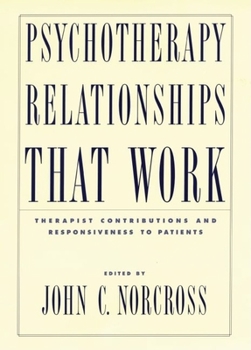Psychotherapy Relationships That Work: Therapist Contributions and Responsiveness to Patients
Select Format
Select Condition 
Book Overview
This book is the result of the American Psychological Association's Division of Psychotherapy (Div. 29) Task Force aimed at applying psychological science to the identification and promulgation of effective psychotherapy. Many efforts to improve therapy have focused on codifying evidence-based treatments, but in doing so have left the psychotherapeutic relationship behind. Clinical experience and research findings underscore that the therapeutic relationship...
Format:Hardcover
Language:English
ISBN:0195143469
ISBN13:9780195143461
Release Date:August 2002
Publisher:Oxford University Press, USA
Length:464 Pages
Weight:2.30 lbs.
Dimensions:1.4" x 10.3" x 7.3"
Customer Reviews
4 ratings
A Much-Needed, Research-Based & Practical Aid to Making Psychotherapy More Effective
Published by Thriftbooks.com User , 14 years ago
"Psychotherapy Relationships That Work" is a much-needed balance to our current near-exclusive focus on psychotherapy "treatments". Research, frankly, shows that relationships are at least, if not more effective than specific treatments for specific disorders. (See, for example, research summaries in the 2nd edition, 2010, The Heart and Soul of Change: Delivering What Works in Therapy.) "Psychotherapy Relationships That Work" gives excellent in-depth summaries for four crucial aspects of client/therapist relationships. First, what works in the relationship "in general" -- what works with all client/therapist relationships. This includes the client/therapist alliance, therapist empathy, and therapist/client goal consensus & collaboration. Second, what research shows that doesn't work in the client/therapist relationship: confrontations, negative process, unchecked assumptions, therapist centricity, rigidity, "ostrich behavior" (ignoring "the elephant in the living room") and "procrustean bed" -- forcing the client into the treatment or into a type of relationship. Third, what research shows that works in individualizing client/therapist relationships. This includes how to adjust/respond to client "resistance" or "reactance", i.e., clients who seem easily provoked or oppositional to therapist in-puts. And it includes adjusting the relationship to the client's functioning level - for DSM folks, the client's Axis V: General Assessment of Functioning or GAF levels. Note: there's far less research on individualizing relationship factors than on generalized relationship factors. Fourth, what relationship factors research suggests are "promising", both "in general" -- across all client/therapist relationships -- and "in particular" -- individualizing client/therapist relationships. Promising "in general" characteristics include the therapist's positive regard or prizing the client; the therapist's genuineness or congruence, the therapist giving feedback to the client (and seemingly more important per recent research, is the client giving regular feedback to the therapist); detecting and repairing the "therapeutic alliance" when the relationship ruptures, the working relationship between client and therapist; limited & targeted therapist self-disclosure; managing the therapist's counter-transference, roughly the therapist's own triggers or hooks; and interpreting or commenting on the client/therapist relationship. Promising aspects to customizing or individualizing include using Prochaska's "stages of change", i.e., the readiness of clients to change; the therapist meeting client relationship expectations and preferences; the therapist meeting the client's basic "attachment style", that is, the way clients bond in important relationships (based on Bowlby, Ainsworth and other attachment researchers & theorists); incorporating client religious and spiritual beliefs; and the therapist incorporating client cultural, gender and age/stage o
Great!
Published by Thriftbooks.com User , 14 years ago
Abundance of supportive research - clear table format Good clinical examples and nice summaries
Great book -- fast shipping.
Published by Thriftbooks.com User , 16 years ago
This book arrived in great shape,and was shipped quickly -- this allowed me to actually have it in time for a class I am taking! What a relief.
An example of what psychotherapy texts should be.
Published by Thriftbooks.com User , 20 years ago
A multitude of studies and meta-analyses indicate that most, if not all, psychotherapy systems are equivalent in efficacy. This repeated finding suggests that emphasis on research and clinical thinking needs to shift toward what psychotherapies have in common, and how interpersonal processes in the psychotherapeutic relationship contribute to outcome. Most therapy texts seem to ignore these trends, and focus on a particular psychotherapy approach (e.g., CBT, psychodynamic, schema), without recognizing that they are all likely to have similar effect.This text fills a needed gap by focusing on "common factors" in different psychotherapies, and processes in the therapeutic relationship that contribute to psychotherapeutic efficacy. The chapters base discussion on empirical research findings without neglecting clinical implementation. Discussion is apppropriately focused on the interpersonal processes contributing to outcome, rather than any theory of change per se.A highly recommended text for anyone seeking to understand the process of what actually happens in the practice of psychotherapy.





